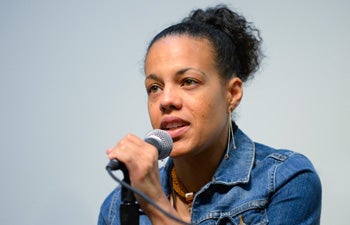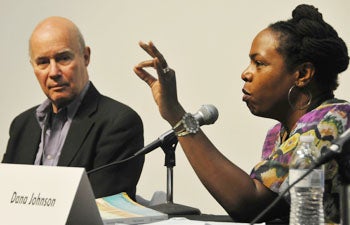Music, Spirit and Truth
It’s that same pang of longing you feel after reading the last word in a great novel. You don’t want to close the book.
The two-day Los Angeles Times Festival of Books celebrated creativity and the written word on April 12 and 13. The 19th annual festival, hosted for the fourth year by USC, drew roughly 150,000 to the USC University Park campus.
Amid live stage performances, music and cooking demonstrations were poetry readings and panel discussions, many involving USC Dornsife faculty.
On Saturday at Hoffman Hall, Shana Redmond, associate professor of American studies and ethnicity at USC Dornsife; Josh Kun, professor at USC Annenberg School for Communication and Journalism, and American studies and ethnicity at USC Dornsife; and Ron McCurdy, professor at the USC Thornton School of Music, were panelists for “Let’s Get Together and Feel All Right: Music, Spirit, Community and Politics.”
The moderator was Varun Soni, USC Dean of Religious Life.
“Music provides the soundtrack to our lives,” Soni said. “Think of the most formative moments of your life, your most cherished occasions, most difficult experiences. It’s likely a song is associated with that memory.”
The same is true not only for individuals, but for communities, he said.
“Music fuels revolutions and revelations. It fuels popular protests, prophetic predictions, social justice and political liberations.”

“Someone said to me that writing about music is like dancing about architecture,” said Shana Redmond, associate professor American studies and ethnicity at USC Dornsife, during an April 11 panel discussion. Photo by Gus Ruelas.
Redmond said her book Anthem: Social Movements and the Sound of Solidary in the African Diaspora (New York University Press, 2014) is about how music becomes a method for social change.
“Ultimately, what I figured out is that music is a politic,” Redmond said. “The music we choose to listen to and the music we mobilize in our political communities is in itself a manifesto.”
When she was writing Anthem, something someone once mentioned stayed with her, she said.
“Someone said to me that writing about music is like dancing about architecture,” she said. “This still haunts me. Well, I think that’s a pretty amazing project. I think everyone should dance about architecture. I took it as a real challenge to think about how best to translate the music.”
To bring the anthems to life, she includes a mixed tape of the seven songs described in the book.
“My students sing the anthems and read the sheet music,” she said, adding that music should be a call to action. When a festival audience member spoke up and lamented a lack of funding for music in schools, Redmond said that young people will always find a way to express themselves through music.
“The absence or withdrawal of funding in our schools is where hip hop comes from,” she said. “They can’t learn the brass instruments in their schools anymore so they take the electricity to the streets.”
SLIDESHOW: Los Angeles Times Festival of Books 2014.
Kun’s project Songs in the Key of L.A. includes an anthology that features songs from the Los Angeles Public Library’s Southern California Sheet Music Collection.
Written in 1959 by Jay Livingston and Ray Evans, “Angeltown” was adopted as the official song of the city of L.A in 1966.
“It’s L.A.’s official anthem and probably no one has heard it,” he said. “The song looks at L.A. like it’s the 19th century. What we found looking at this collection was this tension, this battle between the myth of the sunshine and unspoiled paradise of L.A. and multi-racial, multicultural Los Angeles.”
He said “Angeltown” — with lyrics like “valley green, mountain white, ocean blue and beaches bright; heavenly just to be in Angeltown” — show that a single idea or community can never represent L.A.
“We need multiple songs being made every generation and all the time,” he said. “This is as much about singing songs as a call to action. This is about our jobs as listeners. How we listen to the voices of other people and what we do with the stories and songs and experiences that we consume every day from other people’s voices. We have to embrace the fact that we need multiple voices.”
Another panel at Hoffman on Saturday included University Professor and Leo S. Bing Chair in English and American literature Leo Braudy; Dana Johnson, associate professor of English, both of USC Dornsife; and Mark Jonathan Harris, Academy Award-winning documentary filmmaker of the USC School of Cinematic Arts.
Author Janet Fitch of the Master of Professional Writing (MPW) program at USC moderated the panel titled, “Degrees of Fictionality: Representing ‘Truth’ Across Genres.”
A cultural historian, Braudy spoke about writing his memoir Trying to be Cool: Growing up in the 1950s (Asahina and Wallace, 2013).
“On the cover it says in red letters, ‘based on a true story,’ ” Braudy said. “Anytime you write a memoir it’s about memories. It’s what I remember happening; it’s the people who I remember. I don’t want to claim that it’s true in the absolute sense.
“I tried to balance the naïve somewhat hapless me from my teenage years with another voice that will every once in a while stand back and give a larger context of what’s happening.”
For instance, the book talks about the Cold War, the birth of rock ‘n’ roll and the popularity of science fiction monster movies.
“All of these things were going on in American culture,” he said. “I tried to merge the emotional truth with the factual truth.”

In an April 11 discussion, Dana Johnson, associate professor of English at USC Dornsife, makes a point while University Professor Leo Braudy listens. Photo by Pamela J. Johnson.
In Johnson’s debut novel, Elsewhere, California (Counterpoint Press, 2012), many parallels to her own life can be found. She and her character graduated from USC. Both were born and raised in South L.A. Both moved to West Covina. Differences are there for good reason.
“My own roommate in college was a blonde surfer born and raised on the beach,” Johnson said. “It sounds cliché yet it was true. So I made the roommate of the main character, who comes from a working-class family, African American and wealthy. This makes it more of an interesting question about race and class.”
Fitch said that in the end, there is no such thing as truth in writing without a point of view.
“There’s fact and there’s truth and they are not necessarily the same thing,” Fitch said. “In nonfiction you’re looking for the truth that’s something larger than facts. Facts can be anything, the color blue is a nice color or not. Fiction writers zero in on the truth from one side and nonfiction writers or documentarians do it from another side. They are taking all of these fragments and creating the truth.”
Other Festival of Books USC Dornsife panels included “History: The Golden State” with William Deverell, professor of history; “Are We What We Eat?: The Culture of Food” with Executive Vice Provost Michael Quick, professor of biological sciences; “Fiction: Outside the Margins” with Aimee Bender, professor of English; “Race, Justice and the Law” with Ange-Marie Hancock, associate professor of political science and gender studies.
Also, “Poetry: Forms of Consolation: Traditional and Experimental Poetics” with Carol Muske-Dukes, professor of English and former California poet laureate; “History: Untold Stories of the Holocaust” with Steven J. Ross, professor of history; “L.A. Lives: Making, Mapping and Imagining Southern California” with George Sanchez, professor of American studies and ethnicity, and history, and vice dean for diversity at USC Dornsife; and a reading by Professor of English Emeritus T.C. Boyle.